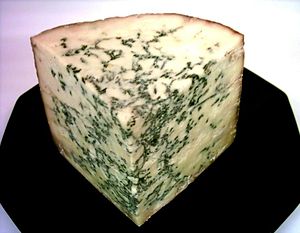Part III of the Good Food Series. The beginning is here, if you missed a segment.
Why does cheese smell so bad?
The ingredients which both make it taste so good and smell so bad create cheese’s distinctive aroma. Looking at the ingredients, and the process, the smell will come into focus.
The How To
Cheese is made by curdling milk, draining away the watery whey, adding bacteria and aging. Different cheeses have different bacteria creating a distinctive taste.
Ammonia is a natural byproduct of the break down of the milk’s amino acids by the bacteria. The ammonia changes the odor from the sweet smell of the cream to the unmistakable smell of the cheese.
Dead or Alive
Softer cheeses sour more quickly, while hard, aged, sharp cheeses will last much longer. Softer cheeses have more moisture. This moisture allows the bacteria to grow inside the cheese, even after its work is finished. In harder cheeses, the bacteria finish their work and die without the moisture.
Not My Kinda Bug
The moisture which fosters the beneficial bacteria also attract some not-so-savory bacteria, mold and fungi. When cheeses grow a fine layer of mold on the outside, the bell tolls the end of the cheese’s life cycle.
Unpasteurized cheese can become not only smelly but deadly cheese. The harmful bacteria get in the cheese anywhere between the cow and the ripening vats. Every once in a while, methods of injecting in the correct bacteria are infected with the wrong bacteria.
Mold I Can Live With
Brie and other soft cheeses have an outer coating of wax and bacteria. This tasty coating is not harmful and makes a sharp punctuation to very sweet cheeses.
Parmesan and other hard cheeses have a layer of mold on the outside which helps protect the cheese during aging. Generally, this layer is discarded before the cheese is processed, packaged and eaten.
The Scent of a Cheese
Learn the smell your fresh cheese versus the smell your expired cheese. It is crucial to knowing whether you really want to eat it. When in doubt, pitch it.
Love for Bugs
Were it not for the little micro-organisms which transform plain milk into the smelly cheeses we know and love, they would have no other smell than sour milk!
~~~~~~~~~~
NEXT: Stir fry over deep fried
What is your favorite cheese?
~~~~~~~~~~




thewaiting
/ November 17, 2011Humboldt Fog! Om nom nom!
annmariedwyer
/ November 17, 2011Never tried it! Where does it originate? Sounds German…Red.
James Parsons
/ November 17, 2011Pepper Jack or Provolone,gosh there good. Always wondered how cheese got so smelly.
annmariedwyer
/ November 17, 2011Love Provolone. So smooth. Red.
awarewriter
/ November 17, 2011Your post reminds me. When Tracy and I were first married, we stopped in to visit my mother. I wrinkled my nose at the pungent aroma of dirty, smelly socks that permeated the kitchen. Then I saw it was just mom eating blue cheese. lol
annmariedwyer
/ November 17, 2011Oh, that is rich! That is one cheese I just cannot bring myself to put in my mouth…cannot get past the smell! Good to see you, McD. LOVED those fog pix. Red.
thewaiting
/ November 17, 2011It’s a goat milk cheese from the US. I seem to recall that it is from Oregon or Washington. It’s becoming more available at grocery stores all over the place.
annmariedwyer
/ November 17, 2011Oh, wonderful! I love goat cheeses. *Scribbles note in BlackBerry to find outlet* Thank you!